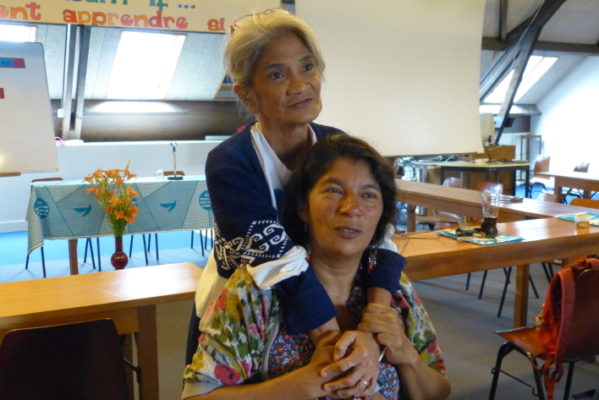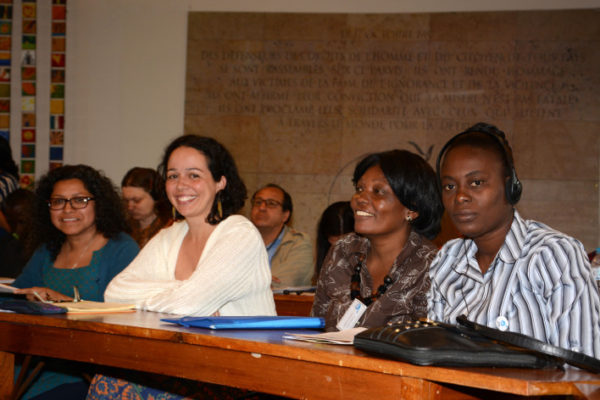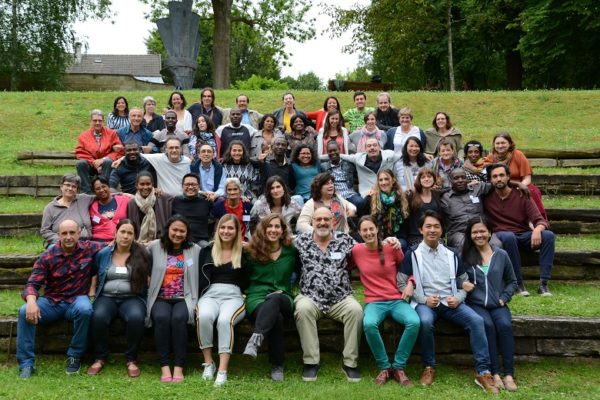Access to Education in the Context of Extreme Poverty
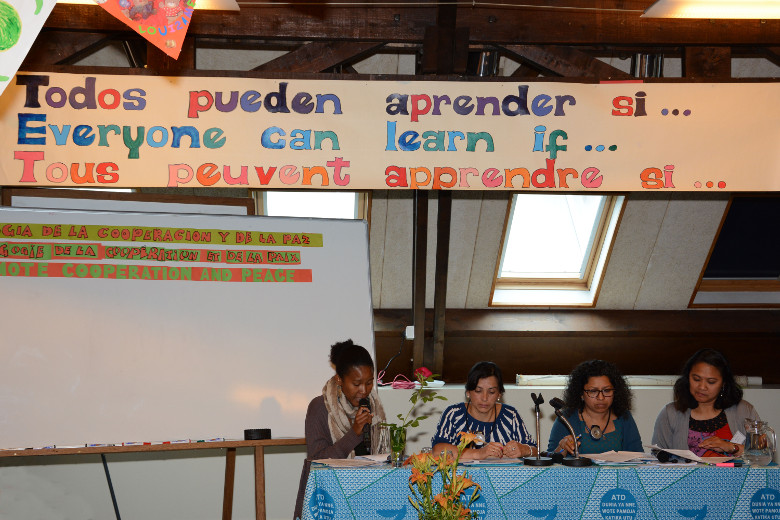
International Seminar on Lessons Learned from Education Activities
In the summer of 2018, ATD Fourth World held an international seminar on lessons learned through projects conducted in a number of Northern and Southern countries around the world. The goal of the seminar, entitled “Everyone Can Learn If…”, was to reflect on work that takes place in areas of extreme poverty where families and communities that experience social exclusion confront multiple obstacles to their children’s access to education. Parents know very well that education is the passport to hope for a better future; but, what education?
Access to quality education is a major focus of ATD Fourth World’s struggle against extreme poverty. Since 2012, “Building Knowledge and Accessing Education — Every Mind Counts” has been the first of three key elements of the organization’s mission. ATD conducts a wide variety of education projects: Street Libraries; Festivals of Learning; cultural activities; pre-schools and other early childhood activities; welcoming spaces for parents and children; assistance obtaining birth certificates and other school paperwork; and support for school attendance. In addition, ATD conducts participatory research with parents, teachers, and researchers as well as advocacy and partnership with national and international institutions working for quality education for all.
Learning from Success
For more than two years prior to the seminar, an international group of ATD Fourth World teams worked together to examine successful activities in the field of education. While there are many obstacles in this area, the teams’ goal was to look at activities that have brought about changes in areas such as: school enrollment, family participation, learning to read, creating dialogue between parents and teachers, renewal of family ties, overcoming shame, awakening the desire to learn, etc.
In order to understand these successes better, the “Learning from Success” method was used to identify key elements such as the context of various activities, the situation before and after changes, what lead to success, the people involved, the material costs, and the time and human effort required to bring about change. In order to develop a shared understanding of what changed over the course of a project, participants were asked to move beyond their own perceptions of success to also see the viewpoints of other people involved.
Delegations from different countries that attended the seminar reflected a number of diverse perspectives. Attendees included parents struggling for their children’s education; teachers from schools and less formal education projects; full-time ATD Volunteer Corps members and allies leading community projects; and specialists in pedagogy, psychology, and children’s rights. Participants talked about what is essential to success in their own area, but also began to understand others’ perspectives on success.
A Fourth World activist from Guatemala explained that she had come to realize the importance of what she knows about people in her neighborhood and how significant her work there is. This activist is a member of the ATD Education Committee in Guatemala. She is very involved as a facilitator between ATD’s work and people in her community. She said:
“I have been a member of ATD Fourth World for years. […] At first, I said that I was not really doing anything, but someone said to me, ‘Actually, you’ve been doing important work for a long time. You’re close to families in your neighborhood. You are at their side when they need to register for and enroll in school…’ During the seminar, with these stories, I learned what ‘education projects’ really are.”
Seminar participants discussed different ways of involving the community in conducting activities and evaluating results. This included reevaluating the very definition of what constitutes success. A sociology student who helped organize the meeting noted that success could include things that go well beyond the initial goals:
“What I learned this week from a lot of stories is the importance of patience, the importance of not being afraid of not knowing exactly what to do right now, but taking the time to understand what’s going on, the time for people to get to know you and to build trust. That makes it is possible to create human relationships that draw on people’s strength, and to focus on the positive.”
Stories of Success
Throughout this seminar, participants took pride in sharing and analyzing twenty-two success stories from projects and initiatives in settings of poverty. They discovered a number of conditions that are necessary for everyone to learn: parents must be respected as primary partners in education; schools must be aware of their role in educating students to be citizens of a just and collaborative society; all community members should keep in mind their role in educating children; and learning should take place in a spirit of cooperation and peace. A psychologist and child development specialist from the United States noted that,
“Everyone can learn if we invest in an authentic, deep, inclusive engagement and partnership with families in difficult circumstances.”
Seminar participants were curious to learn about the different situations in other countries, in both urban and rural environments. There were attendees from small villages in Brazil and Peru and people who work in a large rock quarry in Dar es Salaam. There were families who live in a Manila cemetery and others from low-income housing in Brussels, Montreal, and Paris. The richness of the dialogue between people at the grass-roots level, educators, and other professionals aroused admiration and inspired new ideas. As one Belgian teacher said:
“Maybe teachers and others concerned with education will be touched by these terrific success stories and then create some new ones.”
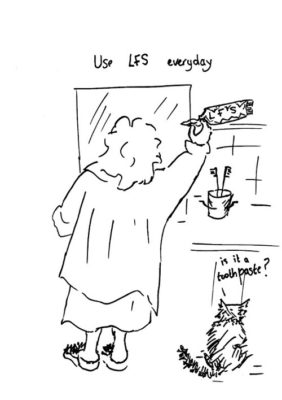 Orna Shemer, an expert in the Learning from Success approach, reminded everyone at the beginning of the seminar that it is more than a method. Learning from Success is a way of being every day that allows people to focus on what they are able to achieve together. Ms. Shemer suggested that the participants should be pleased with and proud of their success. She hoped that they would go back to their communities to share with people there what they have learned, but also that they would continue to be curious. “When you return,” she urged seminar participants, “be creative with what you have learned this week.”
Orna Shemer, an expert in the Learning from Success approach, reminded everyone at the beginning of the seminar that it is more than a method. Learning from Success is a way of being every day that allows people to focus on what they are able to achieve together. Ms. Shemer suggested that the participants should be pleased with and proud of their success. She hoped that they would go back to their communities to share with people there what they have learned, but also that they would continue to be curious. “When you return,” she urged seminar participants, “be creative with what you have learned this week.”
The process of capitalizing on the knowledge gained through action in the field of education did not stop with the seminar. The delegates were excited to tell people in their home communities what they had learned during seminar and to build on this knowledge. In addition, ATD is preparing a book and a video to publicize success stories that illustrate the principles grounding activities that do enable all people to learn and develop their intelligence. The wealth of knowledge gathered during the two-year dialogue and the resulting seminar will also serve to enrich ATD Fourth World’s advocacy in international institutions and its work with the research community studying how to make education accessible to everyone.


